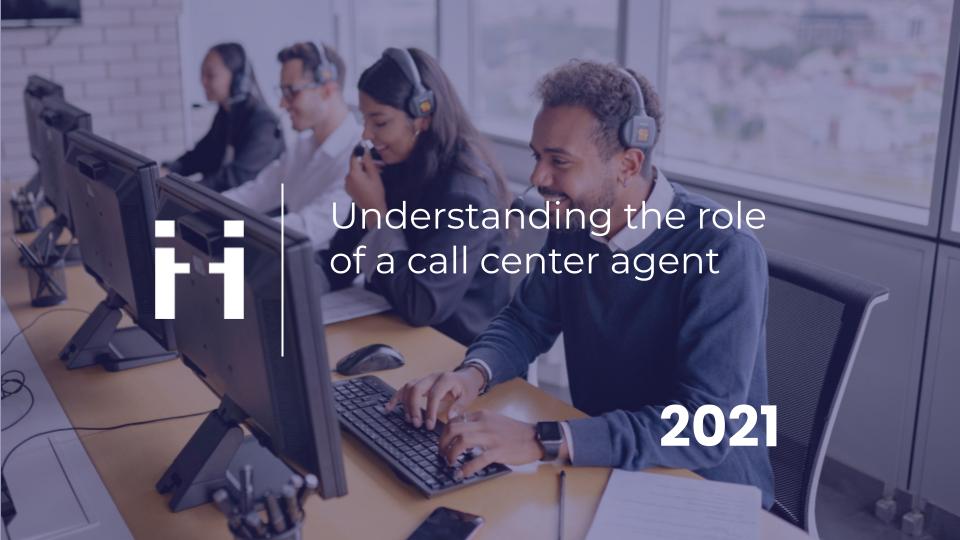
Share this article
Share this article
A call center agent is the backbone of any call center. They are the ones who directly interact with customers, have wide knowledge about customer experiences, and represent the company and its ethics – and they do it on a daily basis. Given the importance of their role, it is crucial for a business to fully understand its responsibilities and keep track of its productivity at all times. How can you evaluate a call center agent’s role and use this knowledge to ensure their performance is of utmost quality? Let’s break it down.
Call center agents take care of one of the most important success factors of a business: direct interactions with customers. Their job is not just about mindlessly answering incoming calls; it’s about much more. Whether your call center is inbound or outbound, here are some of the duties call center agents are responsible for every single day:
Measuring how well agents perform is important because their success correlates to customer satisfaction levels. By looking for common patterns of where they can improve, you can improve many of your call center metrics.
You can measure and evaluate your call center agents’ performance by using Key Performance Indicators (KPI) as your metrics. It is important to remember that both call centers and contact centers have specific KPIs for their industry. These are some KPI features that will help you evaluate your call center reps’ performance.
Considered a key call center performance indicator, First Call Resolution (FCR) shows you how much time it takes for your call center agents to solve customer issues. The first call resolution rate is vital because it will show you whether the approach you are taking to improve your center is working or not. If your FCR is too high, it usually means something is wrong.
Average Handle Time (AHT) measures the time your call center agent spends on a call with a customer – and will therefore give you an overall idea of how fast an agent can resolve customer problems or deal with customer complaints. The most important factors monitored by AHT are the time of speaking with the customer, hold time and call work time.
One of the most important KPIs out there, customer satisfaction, can give you a clear overview of your call center agents’ performance at the time of their work. To get the most accurate customer satisfaction insights, you should measure them regularly. Follow-up with customers after every call by sending them customer feedback surveys, use a ticketing system to store relevant customer data in a designated place and try incorporating it into the permanent knowledge base of your company.
These two crucial KPIs measure how much time your call center agents are spending off the phone. Schedule adherence compares one agent’s scheduled hours to the actual hours they spend working, whereas absenteeism focuses solely on unauthorized absences from work.
There are different solutions you can use to help you improve how your call center agents perform and how successfully your call center software runs, and ensure the quality of your workforce only gets better.
First, make sure you use data from your KPI metrics to your advantage. Regularly compare the performance of different call center agents and identify which ones are less effective with providing utmost customer satisfaction. Based on the customer feedback, evaluate your agents’ strengths and weaknesses – try to find another agent who will excel in customer satisfaction and have them retrain the underperforming agent.
As mentioned above, for optimal organization of your call center administration, you should use a ticketing system that will gather all calls from a single customer and arrange them under a single ticket. Relying on a ticketing solution from ViiBE will allow you to easily determine how many times an agent or agents had to call a customer in order to resolve the issue.
When you have assessed which call center agents perform best in different customer interactions, it’s time to establish how to organize your call routing so that your agents can reach more customers, while saving your customers time. ViiBE’s expertise call routing puts the caller in touch with the right person from the start, which in the end will reduce both your Average Handle Time and your Average Speed of Answer – and empowers your call center agents, as they only operate in the field they feel most skilled at.
A well-organized and centralized knowledge base with data on customer satisfaction and the performance of each call center agent will fill in the gaps of your employees’ knowledge by allowing them to access an up-to-date database of best-performing conduct and information at any time. To make it easier for your team, there are designated systems that can help you keep track of all the employee knowledge you will ever need – such as ViiBE’s knowledge management system, which distributes employee knowledge evenly.
A well-designed training program is essential to ensuring your employees are as effective at their job as possible. Old or new, each employee should have an opportunity to learn about new developments in the field and regularly ameliorate their customer service skills. For example, new employees should undergo extensive training as part of the onboarding process, whereas existing employees should receive regular retraining when procedures are significantly updated.
Call center agents work in the heart of your business, hence it is crucial to be well-aware and up to date with how well they perform. KPIs such as FCR, AHT, and customer satisfaction are effective ways to measure and evaluate individual employee performance and are a good indicator of how to go about striving to improve the quality of their job. After all, it is call center agents who deal with your most precious business success indicators – your customers.

Free E-book available now!